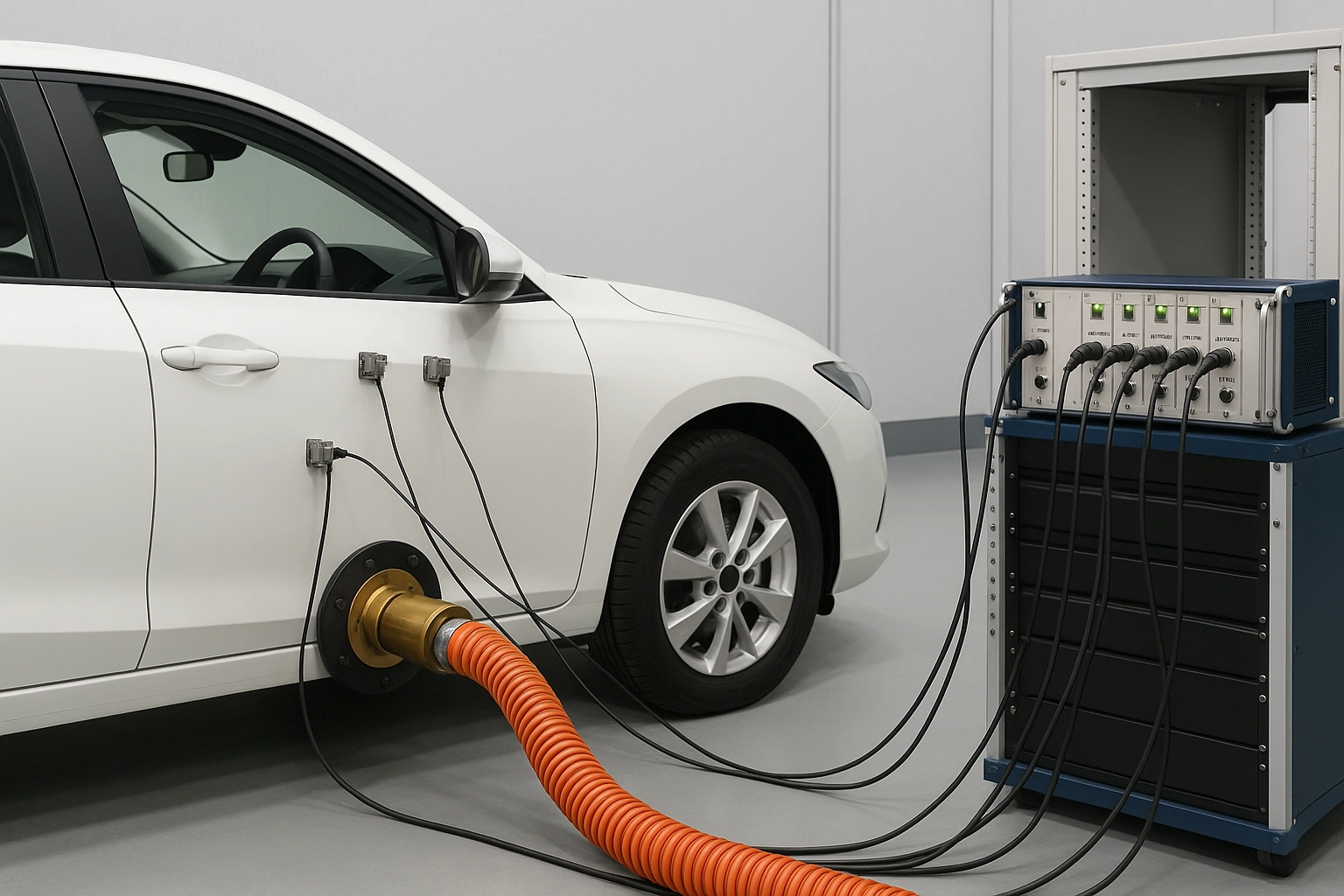NF EN 60512 Connector Durability NVH Acoustic Testing
The NF EN 60512 standard specifies the requirements and test methods for connectors used in electrical circuits, particularly focusing on their durability under various environmental conditions. This testing is crucial for ensuring that connectors can withstand long-term use without degradation or failure, which is especially important in automotive applications where reliability is paramount.
During this specific type of testing, connectors are subjected to a series of controlled acoustic environments designed to simulate real-world usage scenarios. The goal is to assess the connector’s ability to maintain its functionality and integrity over time under varying noise, vibration, and harshness conditions. This process involves not only mechanical stress but also environmental factors such as temperature fluctuations and humidity.
The testing typically includes a series of steps aimed at evaluating the durability of connectors under these specific conditions:
- Initial installation simulation
- Exposure to noise levels up to 120 dB
- Vibration tests following ISO 6853-1 and ISO 6853-2 standards
- Humidity cycling to simulate environmental exposure
The test setup for NF EN 60512 involves sophisticated acoustic chambers capable of generating controlled sound levels, vibration platforms that can replicate road conditions, and climate chambers for humidity testing. These tools are essential in replicating the harsh environments connectors face during their operational life cycle.
One key aspect of this testing is the use of real-world data to establish acceptable noise thresholds. Engineers gather data from various vehicle types and road surfaces to determine what constitutes an acceptable level of noise. This information helps tailor the testing protocol to ensure that it accurately reflects actual conditions encountered by connectors in automotive environments.
The results of this testing are critical for quality managers, compliance officers, and R&D engineers as they provide insights into the long-term performance of connectors. By adhering to NF EN 60512 standards, manufacturers can ensure their products meet stringent international requirements, thereby enhancing customer trust and satisfaction.
The data collected from these tests is used for several purposes:
- To improve product design
- To optimize manufacturing processes
- To enhance durability under real-world conditions
- To meet regulatory compliance requirements
Quality managers and R&D engineers rely on these tests to identify potential weaknesses in connector design early in the development process, allowing for timely corrections. Compliance officers use the results to ensure that all products comply with relevant regulations, while procurement teams can leverage this information to select suppliers who meet rigorous testing standards.
By investing in comprehensive NF EN 60512 testing, automotive manufacturers not only enhance product reliability but also contribute positively to industry standards and best practices. This commitment to excellence supports the overall improvement of vehicle performance and safety.
Industry Applications
The NF EN 60512 connector durability NVH acoustic testing is particularly relevant in automotive manufacturing, where connectors are integral components that connect various electrical systems within the vehicle. These connections must be reliable and robust to withstand the rigors of daily use and harsh environmental conditions.
Automotive manufacturers employ this testing method across a wide range of connector types used throughout different parts of the vehicle:
- Connectors in engine control units
- Signal connectors for sensors and actuators
- Data bus connectors for communication between various electronic systems
- Power distribution connectors to ensure consistent power supply throughout the vehicle
By focusing on connector durability, manufacturers can reduce maintenance costs associated with premature failure of these critical components. Additionally, this testing helps improve overall vehicle performance and safety by ensuring that all electrical connections function optimally under varied conditions.
The benefits extend beyond just the automotive industry to include other sectors where connectors are used in harsh environments:
- Aviation: Ensuring reliable connections for avionics systems
- Military: Testing connectors for use in military vehicles and equipment
- Railway: Evaluating connectors for use in railway signaling systems
In these industries, the principles of NF EN 60512 testing are adapted to meet specific sector requirements. However, the core focus remains on ensuring that connectors maintain their integrity and functionality under extreme conditions.
Environmental and Sustainability Contributions
The environmental impact of automotive manufacturing is a significant concern in today’s sustainability-focused industry. By adhering to rigorous testing standards like NF EN 60512, manufacturers can contribute positively to environmental conservation efforts:
- Reduced Waste: Ensuring that connectors last longer through durability tests reduces the need for frequent replacements, thereby minimizing waste.
- Energy Efficiency: Reliable connections contribute to overall vehicle efficiency by ensuring optimal performance of all electrical systems.
- Sustainable Materials: The testing process encourages manufacturers to select sustainable materials that are durable and recyclable.
Incorporating environmental considerations into the testing process not only benefits the immediate product but also supports long-term sustainability goals. By promoting durability, automotive companies contribute to a more efficient and environmentally friendly industry.
Use Cases and Application Examples
The NF EN 60512 connector durability NVH acoustic testing is widely used in various stages of the automotive development process. Here are some specific use cases:
- New Product Introduction (NPI): During the initial design phase, manufacturers use this test to ensure that connectors can withstand the rigors of real-world conditions.
- Routine Quality Assurance: This testing is performed regularly as part of quality control measures to maintain product consistency and reliability.
- Supplier Evaluation: Before selecting a supplier, automotive manufacturers conduct this test to evaluate the durability and reliability of connectors supplied by different vendors.
- Regulatory Compliance: Testing ensures that products comply with international standards set forth in NF EN 60512, thereby facilitating market entry into various regions.
These use cases underscore the importance of comprehensive testing in ensuring product reliability and compliance. By incorporating these tests into their development processes, automotive companies can enhance overall vehicle performance and safety, contributing to a more sustainable and efficient industry.





